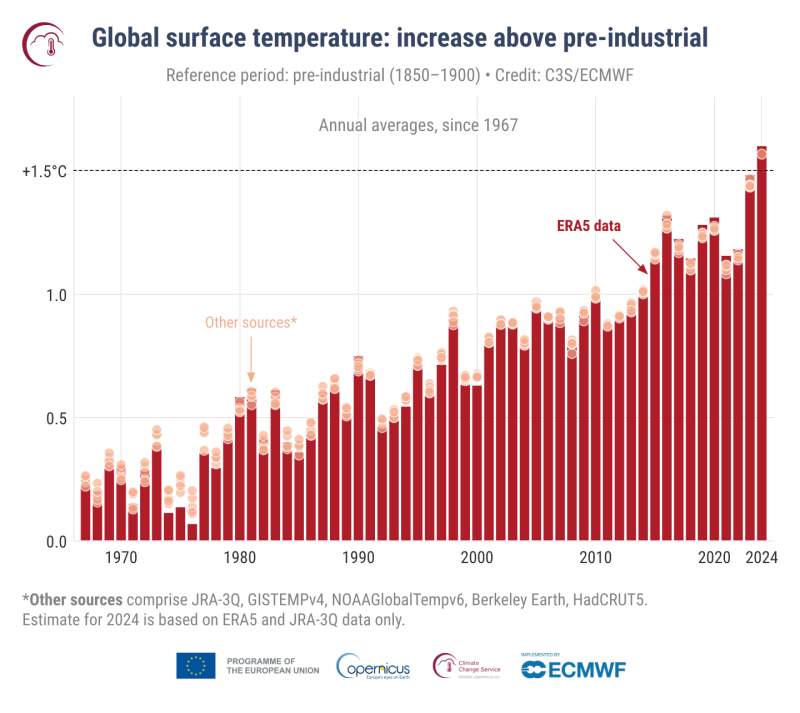With global warming topping the key limit of 1.5C last year, adapting to worsening climate impacts has become a “necessity”, top scientist warns
Europe’s climate service said on Friday that 2024 was the hottest calendar year on record and the first in which average temperatures exceeded the key limit of 1.5C above pre-industrial times, raising the importance of efforts to protect people from dangerous impacts.
The confirmation – widely trailed before the announcement – came as wildfires made worse by drought conditions rampaged across Los Angeles, causing at least 10 deaths, large-scale evacuations and panic in Hollywood, the affluent centre of the US film industry.
The Copernicus Climate Change Service (C3S) said that all of the internationally produced global temperature datasets show that 2024 was the hottest year since records began in 1850. That individual year reached 1.6C above an estimate of pre-industrial temperatures.
The World Meteorological Organization (WMO) endorsed the findings later on Friday, saying that 2024 was the warmest year on record, based on six international datasets, marking “an extraordinary streak of record-breaking temperatures” over the past 10 years.
Each year in the last decade is one of the ten warmest on record, it added. Reacting to the news, United Nations Secretary-General Antonio Guterres said: “Global heating is a cold, hard fact.”
“Blazing temperatures in 2024 require trail-blazing climate action in 2025,” he added, calling on governments to deliver new national climate action plans this year to limit long-term global temperature rise to 1.5°C, and support the most vulnerable to deal with devastating climate impacts.

C3S director Carlo Buontempo emphasised that “the underlying physics is very clear”, with the world’s warmer air and seas leading to more frequent and intense extreme events – from heatwaves to heavier rainfall and more destructive storms.
As a result, he said, “our traditional system to cope with and respond to extreme climate events is being tested to the limits. This is why adaptation is no longer an option – but a necessity.”
On the edge of 1.5C
Samantha Burgess, strategic lead for climate at the European Centre for Medium-Range Weather Forecasts, which runs Copernicus, said the global temperature over the past two years – averaging 1.54C above pre-industrial times – had surpassed the internationally agreed warming goal of 1.5C as set out in the 2015 Paris climate pact.
“We are now teetering on the edge of passing the 1.5C level defined in the Paris Agreement,” she said – although C3S and the WMO emphasised that does not mean the flagship goal has been lost as it refers to an average over a period of at least 20 years.
“These high global temperatures, coupled with record global atmospheric water vapour levels in 2024, meant unprecedented heatwaves and heavy rainfall events, causing misery for millions of people,” Burgess added.
With drought-hardy cows, Botswana prioritises adaptation in new climate plan
Last month, researchers collaborating with the World Weather Attribution (WWA) and Climate Central projects said climate change had intensified 26 of the 29 extreme weather events they studied during 2024.
Those disasters killed at least 3,700 people and displaced millions – but were only a small sample of what was experienced on the frontlines of a hotter world. They included severe floods in eastern Spain, hurricanes in the US, drought in South America’s Amazon rainforest, and flooding across West and Central Africa.
“Whether it is at a level below or above 1.5C of warming, every additional increment of global warming increases the impacts on our lives, economies and our planet,” WMO Secretary-General Celeste Saulo said in a statement.
‘Tested to the limits’
Government efforts to adapt to climate extremes – through measures such as installing alerting systems, preparing evacuation centres, strengthening homes and flood barriers, and protecting ecosystems – have lagged behind the gathering speed of impacts, leading to growing economic damage.
On Thursday, Munich Re, the world’s largest insurer, said hurricanes, storms, floods and other natural disasters caused an estimated $140 billion in insured losses in 2024, up from 2023 and one of the costliest years on record.
“We are facing very new climate c
Read More

